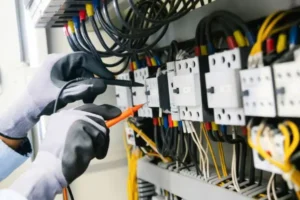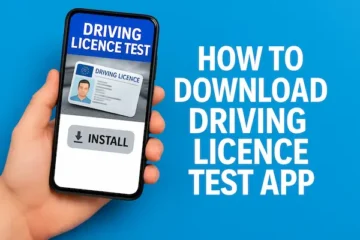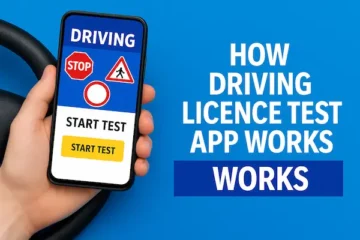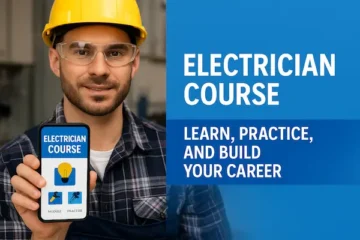Electrical engineer online courses: How to apply for free
If you dream of becoming an electrical engineer, now is your time. Find out how to enroll in the best electrical engineer online courses.
Do you want to start a technical career with high demand, good salaries, and flexible work options — without spending a fortune?
Then keep reading, because we’re going to show you how to apply for the best electrical engineer online courses completely free and from anywhere you are.
Registration process online for electrical engineer online courses
Applying for an online electrical engineering course is much simpler than most people think.
Today, several institutions, platforms, and organizations offer free courses with quality content, even with certification.
To start your journey, all you need is a device connected to the internet and the desire to learn something that can completely change your career path.
The online registration process typically involves creating an account on the course platform, filling in basic information, and selecting the course that best fits your profile.
Most courses are self-paced, which means you can start right after registration and learn in your own time.
Some platforms may require a quick placement test or interest form, but nothing complicated — it’s just a way to personalize your learning experience.

Registration step by step
To make things even easier, here’s a detailed step-by-step to register for free electrical engineer online courses:
-
Access the official website of the platform offering the course (such as edX, Coursera, Udemy, or government programs).
-
Create a free account using your email or connect via Google or Facebook.
-
Search for the term “electrical engineer online courses” in the search bar.
-
Filter the results by price (choose “free”), language, and level (beginner, intermediate, or advanced).
-
Choose the course that most interests you and read the full description to ensure it aligns with your goals.
-
Click on “Enroll” or “Start Now,” and the course will be added to your profile.
-
If a certificate is offered, check if there’s a free option or financial aid available — most platforms do offer it.
-
Start your classes immediately and follow the modules at your own pace.
How the electrical engineer online courses works?
The electrical engineer online courses are designed to replicate the learning structure of a classroom but with total flexibility.
You’ll study through video lessons, downloadable materials, practical projects, and interactive quizzes.
Courses are divided into modules or levels, starting with basic concepts like circuits and measurements, and progressing to complex topics like electromagnetism and power systems.
Most platforms offer progress tracking so you always know which topics you’ve already covered and what comes next.
Some courses include forums where you can interact with other students and instructors, exchanging ideas and solving doubts.
Weekly assignments and mini-projects help fix the content and simulate real engineering challenges.
Many courses also bring guest professionals or case studies to show you how the theory is applied in real life.
The best part is that you don’t need prior knowledge in engineering to begin — the beginner courses are built from scratch.
If you’re already working in the area or have technical knowledge, you can choose more advanced levels and specialize.
By the end, you’ll receive a certificate (in most cases), which can be used to improve your resume or LinkedIn profile.
Job market after electrical engineer online courses
Electrical engineering is one of the most in-demand and essential fields in today’s job market.
Professionals in this area work in energy companies, industries, technology startups, construction, automation, and even in space agencies.
The average salary varies depending on the country, but in most regions, electrical engineers earn above-average wages.
In the United States, for example, the average salary for an electrical engineer is over $80,000 per year.
Entry-level professionals can start with lower salaries but quickly grow as they gain experience or specialize.
In emerging markets, electrical engineers are also being increasingly valued due to the rise in infrastructure and energy projects.
Another great advantage is the flexibility — many professionals work in hybrid or remote models, especially in project or consulting roles.
Freelancers in this field are also thriving, offering services to small companies and startups needing efficient and sustainable energy systems.
Completing one or more electrical engineer online courses opens many doors for those looking to switch careers, get promoted, or simply enter the tech world with solid knowledge.
Content covered in the electrical engineer online courses
The content of the courses is very complete and suitable for different levels of knowledge.
From basic math concepts to the application of electrical engineering in renewable energies, the variety is impressive.
Here are some of the main topics you will find:
-
Electrical circuits and current laws
-
Ohm’s Law and voltage measurements
-
Electrical safety and protection systems
-
Alternating current (AC) and direct current (DC)
-
Energy efficiency and sustainable systems
-
Electromagnetism and magnetic fields
-
Signal processing and microcontrollers
-
Energy distribution and transmission networks
-
Use of software for electrical design (AutoCAD, MATLAB, etc.)
-
Project management and entrepreneurship in engineering
These topics are addressed with updated methodologies and include real-life examples to reinforce learning.
Who are the electrical engineer online courses for?
These courses are ideal for anyone who wants to learn about electrical engineering, whether starting from scratch or already working in the field.
High school and technical school graduates looking for a career with high employability can greatly benefit.
People in career transitions, looking to enter the technology or energy sector, also find excellent opportunities in these programs.
Professionals from related areas — such as mechanics, electronics, or computing — use these courses to broaden their knowledge and open up new opportunities.
University students often use online courses to complement what is learned in their undergraduate classes or to prepare for internships.
Entrepreneurs in the technology or energy segment also find value, as they learn how to improve processes and manage energy resources more efficiently.
Anyone passionate about how things work, who enjoys challenges and wants to be part of the world’s transformation through technology, should consider enrolling.
Even retirees or hobbyists who love engineering and want to keep learning can enjoy these courses.
How to choose the best electrical engineer online courses?
Choosing the best course will depend on your goals, availability, and prior knowledge.
Start by defining whether you want a basic introduction or an in-depth course with certifications and practical projects.
Check if the platform offers support materials, feedback from other students, and if the course is updated.
Look for instructors who are experienced professionals or teachers from recognized institutions.
Always read the course program before enrolling and check if it includes the areas you want to specialize in.
Prefer platforms that offer certifications accepted by companies and educational institutions.
Make sure the course language is accessible to you — some platforms have subtitles and multilingual options.
Don’t be afraid to try more than one course — many are free, and you can explore different approaches.
Checklist to choose a good course:
-
Verified and recognized platform
-
Updated and practical content
-
Experienced instructors
-
Certificate available
-
Flexible learning (you choose the pace)
-
Positive reviews from students
-
Financial aid or 100% free option
What are the requirements to start?
Most online electrical engineering courses have no rigid prerequisites.
All you need is an internet connection, a computer or smartphone, and the willingness to learn.
Some courses recommend prior knowledge in math or physics, but this is not mandatory.
In general, beginner-level courses are very accessible even for those who have never studied the subject.
If you want a more technical or advanced experience, then it might be useful to review basic algebra or physics concepts.
But rest assured: most platforms offer support and extra materials to help you at every stage.
Do I receive a certificate at the end?
Yes, many electrical engineer online courses offer a certificate of completion.
In platforms like Coursera or edX, certificates are often included for free or offered via financial aid.
These certificates are useful for your professional profile, especially on LinkedIn or when applying for jobs.
They demonstrate your interest, commitment, and initiative to learn something new.
However, it’s important to verify this information before starting — some platforms only release the certificate after completing all activities.
And remember: the value of the certificate depends more on your dedication and learning than on the paper itself.
Can I use what I learn to work right away?
Yes, especially if you combine the course with personal projects or freelance jobs.
After completing a free online course, you can start applying your knowledge in simple electrical installations or even offer consulting for small businesses.
Some students create prototypes, participate in maker communities, or build an online portfolio with what they learned.
If you already have a technical or university degree, the online courses serve as great updates and specializations.
In all cases, practical experience is key — so use what you learn in real contexts.
There are many stories of people who started with online courses and now work in large companies or have their own business.
Are these electrical engineer online courses worth it?
Absolutely.
They are a real opportunity for those who want to enter a high-paying, respected, and constantly evolving field.
With the growth of clean energy, smart cities, and technological innovation, the demand for electrical engineers keeps increasing.
Online courses allow you to learn wherever and whenever you want, adapting to your routine.
They are accessible, practical, and often free — which removes many of the traditional barriers of education.
The knowledge acquired can be used in jobs, entrepreneurship, or academic projects.
And the best part: you can start today without paying anything and already take your first step toward a career full of possibilities.
If you’ve read this far, it means you’re already committed to your growth.
So go ahead and apply.
Your future as an electrical engineer starts now.






